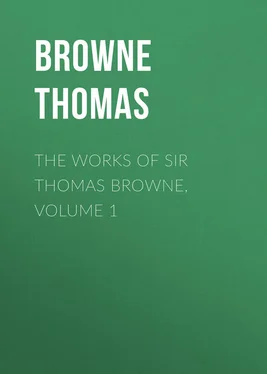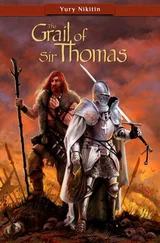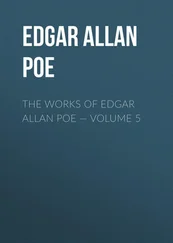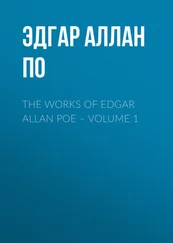Thomas Browne - The Works of Sir Thomas Browne, Volume 1
Здесь есть возможность читать онлайн «Thomas Browne - The Works of Sir Thomas Browne, Volume 1» — ознакомительный отрывок электронной книги совершенно бесплатно, а после прочтения отрывка купить полную версию. В некоторых случаях можно слушать аудио, скачать через торрент в формате fb2 и присутствует краткое содержание. ISBN: , Жанр: foreign_antique, foreign_prose, на английском языке. Описание произведения, (предисловие) а так же отзывы посетителей доступны на портале библиотеки ЛибКат.
- Название:The Works of Sir Thomas Browne, Volume 1
- Автор:
- Жанр:
- Год:неизвестен
- ISBN:http://www.gutenberg.org/ebooks/39960
- Рейтинг книги:5 / 5. Голосов: 1
-
Избранное:Добавить в избранное
- Отзывы:
-
Ваша оценка:
- 100
- 1
- 2
- 3
- 4
- 5
The Works of Sir Thomas Browne, Volume 1: краткое содержание, описание и аннотация
Предлагаем к чтению аннотацию, описание, краткое содержание или предисловие (зависит от того, что написал сам автор книги «The Works of Sir Thomas Browne, Volume 1»). Если вы не нашли необходимую информацию о книге — напишите в комментариях, мы постараемся отыскать её.
The Works of Sir Thomas Browne, Volume 1 — читать онлайн ознакомительный отрывок
Ниже представлен текст книги, разбитый по страницам. Система сохранения места последней прочитанной страницы, позволяет с удобством читать онлайн бесплатно книгу «The Works of Sir Thomas Browne, Volume 1», без необходимости каждый раз заново искать на чём Вы остановились. Поставьте закладку, и сможете в любой момент перейти на страницу, на которой закончили чтение.
Интервал:
Закладка:
Fierce Nemesis, mother of fate and change,
Sword-bearer of th' eternal providence,
Turns her stern look at last into the West,
As griev'd to see on Earth such happy rest;
And for Pandora calleth presently,
Pandora Jove's fair gift that first deceived
Poor Epimetheus in his imbecility.
That though he had a wondrous boon received,
By means whereof curious mortality
Was of all former quiet quite bereaved.
To whom being come deckt with all qualities,
The wrathful goddess breaks out in this wise:
Dost thou not see in what secure estate,
Those flourishing fair Western parts remain?
As if they had made covenant with fate,
To be exempted free from others pain,
At one with their desires, friends with debate,
In peace with Pride, content with their own gain.
Their bounds contain their mindes, their mindes applyed
To have their bonds with plenty beautified.
Devotion (Mother of Obedience)
Bears such a hand on their credulity,
That it abates the spirit of eminence,
And busies them with humble piety:
For see what works, what infinite expence,
What Monuments of zeal they edifie,
As if they would, so that no stop were found,
Fill all with Temples, make all holy ground.
But we must cool this all-believing zeal,
That hath enjoy'd so fair a turn so long , etc.
Dislike of this first by degrees shall steal,
As upon souls of men perswaded wrong;
And that the sacred power which thus hath wrought,
Shall give her self the sword to cut her throat.
Go therefore thou with all thy stirring train
Of swelling Sciences (the gifts of grief)
Go loose the links of that soul-binding chain,
Enlarge this uninquisitive Belief:
Call up mens spirits, that simpleness retain,
Enter their hearts, and knowledge make the Thief
To open all the Doors to let in Light,
That all may all things see but what is right.
Opinion arm against opinion (grown)
Make new-born contradictions still arise,
As if Thebes Founder (Cadmus) tongues had sown
Indent of teeth, for greater mutinies:
Bring new defended faith against faith known,
Weary the soul with contrarieties,
Till all Religion become Retrograde,
And that fair lye the mask of sin be made:
And better to effect a speedy end,
Let there be found two fatal Instruments,
The one to publish, th' other to defend Printing
Impious contention, and proud discontents:
Make that instamped characters may send
Abroad to thousands, thousand mens intents;
And in a moment may dispatch much more,
Than could a world of pens perform before;
Whereby all quarrels, titles, secrecies,
May unto all be presently made known,
Factions prepar'd, parties allur'd to rise,
Seditions under fair pretences sown;
Whereby the vulgar may become so wise
That with a self-presumption overgrown,
They may of deepest mysteries debate,
Controul their betters, censure acts of State.
And then when this dispersed mischief shall
Have brought confusion in each mystery,
Call'd up contempts of State in general,
And ripen'd the humour of impiety,
Then take the other engine wherewithal Guns
They may torment their self-wrought misery;
And scourge each other in so strange a wise,
As time or tyrants never could devise , etc.
For the other Invention, the Latine Annotator doubts whether the Author means Church-Organs, or Clocks? I suppose he means Clocks, because I find that Invention reckon'd by a German , with the other two, as a remarkable one. It is by Busbequius , speaking of the Turks, who hath these words: Testes majores minoresque bombardæ, multaque alia quæ ex nostris excogitata ipsi ad se avertunt; at libros tamen typis excuderent, horologia in publico haberent, nondum adduci potuerunt. Epist. Legat. Turcic. I suppose if he had known any Invention which next to the other two had been greater than this, he would not have named this, and this being the next considerable, we have no cause to doubt but the Author meant it.
To maintain the Trade and Mystery of Typographers. ] Of this Cunæus in his Satyre Sardi vœnates . Qui bis in anno nomen suum ad Germanorum nundinas non transmittit, eruditionem suam in ordinem coactam credit, itaq; nunquam tot fungi una pluvia nascuntur, quot nunc libri uno die .
Sect. 25. Pag. 40.
The Turk in the bulk that he now stands, is beyond all hope of conversion. ] That is, in respect of his great strength, against which it is not probable the Christians will prevail, as it is observed by Monsieur de Silhon . La Race des Ottomans (saith he) quæ oste a Dieu la Religion qu'il a revelee, et aux hommes la liberte que le droit des Gens leur laisse a fait tant de progres depuis trois Cens et quelques annees qu'il semble qu'elle n'ait plus rien a craindre de dehorse, et que son empire ne puisse perir que par la corruption de dedans, et par la dissolution des parties qui composent un corps si vaste. Mr. de Silhon en son Minist. D'Estat. l. 1. c.
None can more justly boast of persecutions, and glory in the number and valour of martyrs. ] Of the fortitude of the Christians in this particular, Minutius Felix , in the person of the Ethnique, hath these words, Per mira stultitia et incredibili audacia spernunt tormenta præsentia, dum incerta metuunt et futura; et dum mori post mortem timent, interim mori non timent. And afterwards, when he speaks in the person of the Christian, he saith, that Christian women and children have in this surpassed Scævola and Regulus : Viros (saith he) cum Mutio vel cum Atilio Regulo comparo: pueri et mulierculæ nostræ cruces et Tormenta, feros et omnes suppliciorum terriculas inspirata patientia doloris illudunt . Minut. in Octav. vide Aug. de Civit. Dei, lib. 1. c. 23, 24 .
If we shall strictly examine the circumstances and requisites which Aristotle requires to true and perfect valour, we shall find the name onely in his Master Alexander, (that is, no more than the name) and as little in that Roman worthy Julius Cæsar. ] Aristot. 3. Ethic. cap. 6. amongst other requisites, requires to valour, that it keep a mediocrity betwixt audacity and fear; that we thrust not our selves into danger when we need not; that we spare not to shew our valour when occasion requires: he requires for its proper object, Death; and to any death, he prefers death in War, because thereby a man profits his Country and Friends; and that he calls mors honesta , an honest or honourable death: and thereupon he defines a valiant man to be, Is qui morte honesta proposita, iisq; omnibus quæ cum sint repentina mortem adfuerunt metu vacat . So that by the Author's saying, there was onely the Name in Alexander , he means only that which is rendred in the two last words, metu vacans , and not the rest that goes to make up the definition of a valiant man, which is very truly affirmed of Alexander , who exposed himself to hazzard many times when there was no cause for it: As you may read in Curtius , he did, in the siege of Tyrus , and many other ways. Cettuy-cy semble rechercher et courir à force les dangiers comme un impetueux torrent, qui choque et attaque sans discretion, et sans chois tout ce qu'il rencontre , saith Montaign , speaking of Alexander, l. 2. des Ess. cap. 34 . And for Cæsar , it cannot be denied, but in his Wars he was many times (though not so generally as Alexander ) more adventrous than reason military could warrant to him; and therefore Lucan gives him no better Character than
Читать дальшеИнтервал:
Закладка:
Похожие книги на «The Works of Sir Thomas Browne, Volume 1»
Представляем Вашему вниманию похожие книги на «The Works of Sir Thomas Browne, Volume 1» списком для выбора. Мы отобрали схожую по названию и смыслу литературу в надежде предоставить читателям больше вариантов отыскать новые, интересные, ещё непрочитанные произведения.
Обсуждение, отзывы о книге «The Works of Sir Thomas Browne, Volume 1» и просто собственные мнения читателей. Оставьте ваши комментарии, напишите, что Вы думаете о произведении, его смысле или главных героях. Укажите что конкретно понравилось, а что нет, и почему Вы так считаете.












